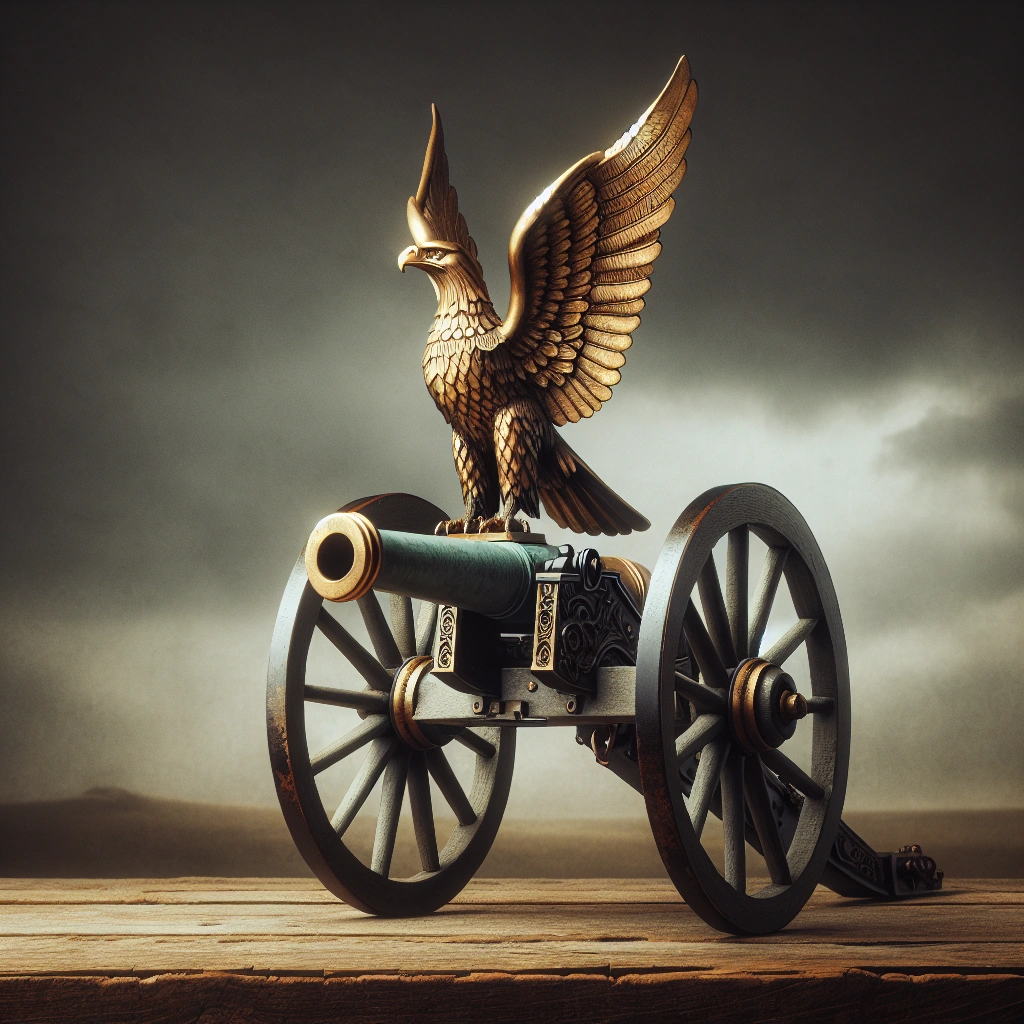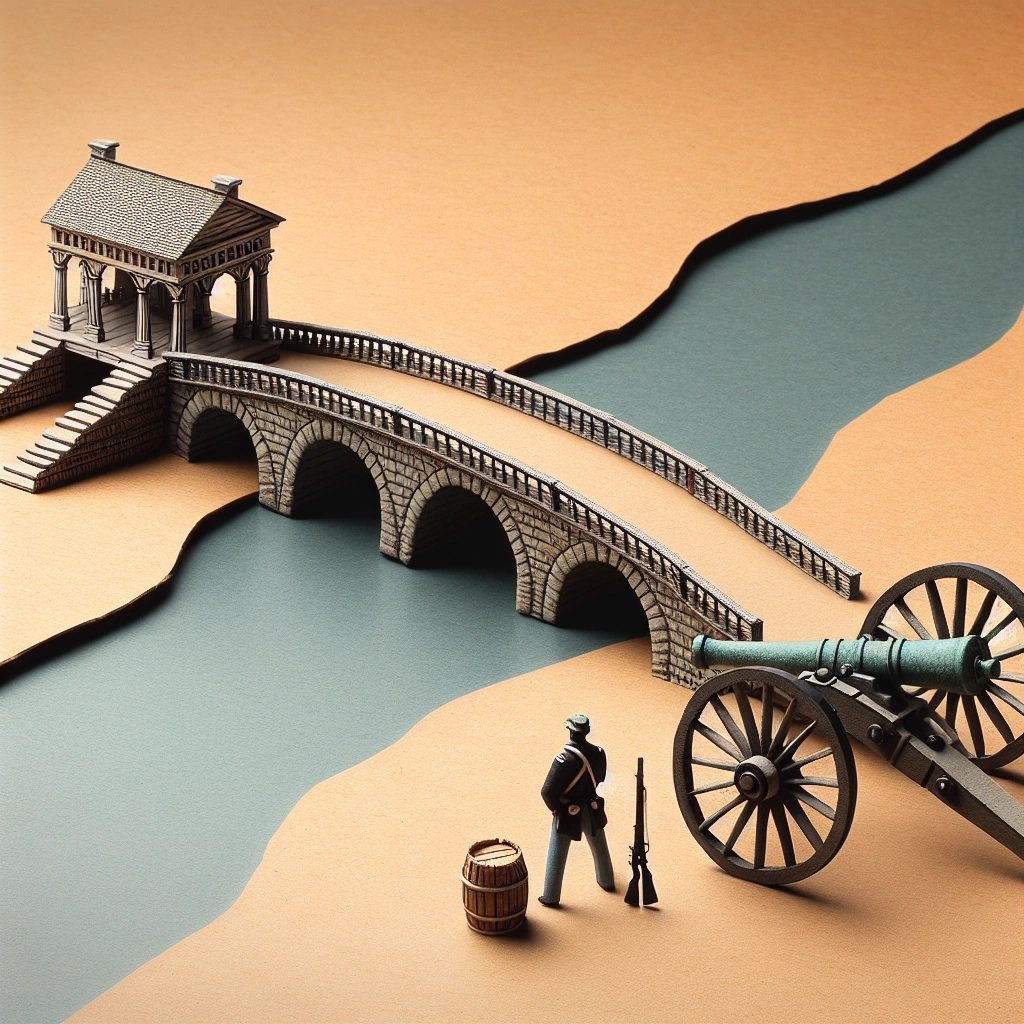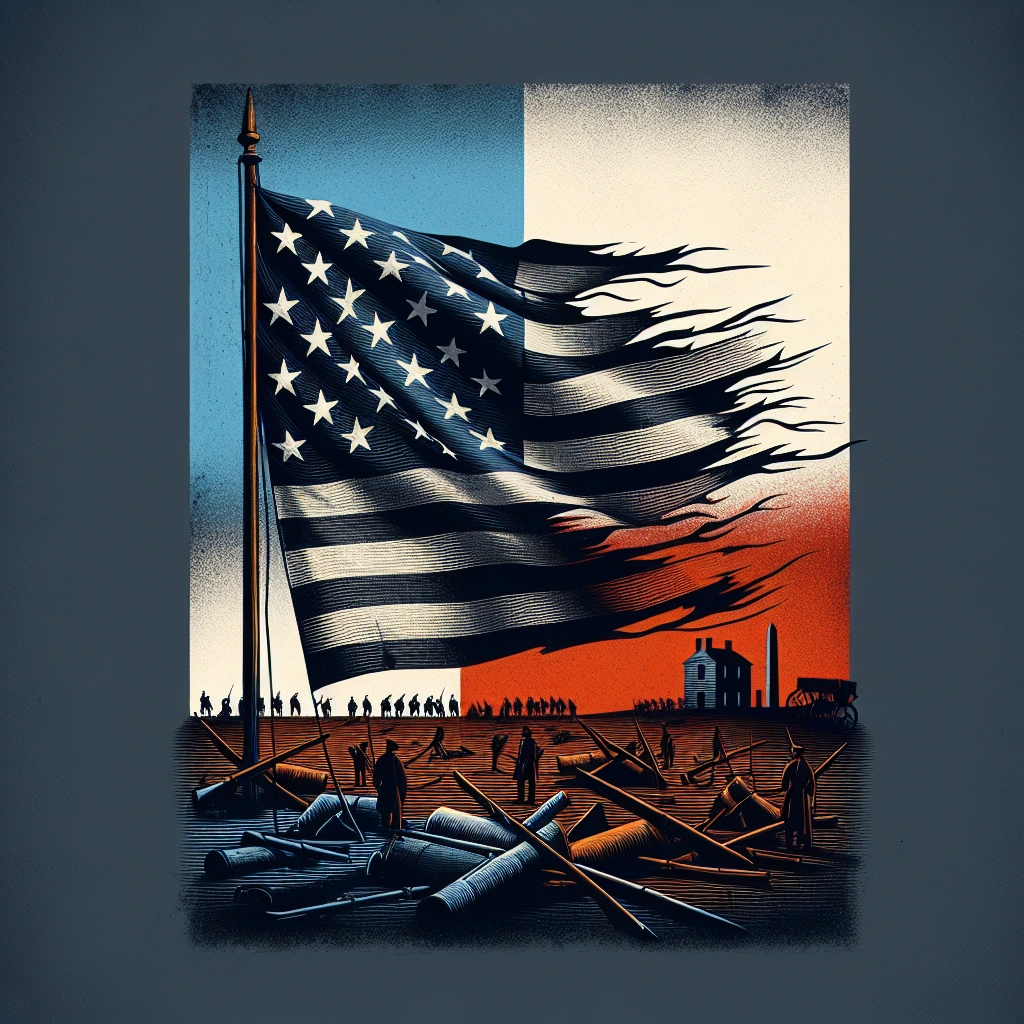Short Answer for Why Did the Battle of Fredericksburg Happen?
The Battle of Fredericksburg happened because the Union aimed to capture the Confederate capital, Richmond, by securing a decisive victory through capturing the strategically located city of Fredericksburg, which was crucial for their progression towards Richmond.
Imagine standing at a crossroads in history, where every decision and every moment could alter the fate of a nation. The Battle of Fredericksburg wasn’t just a clash of armies; it was a heart-wrenching chapter in the American Civil War that underscored the stark realities of conflict, loss, and the struggle for what each side believed was right. This is where ambition met tragedy head-on.
The reason this battle unfolded as it did traces back to the Union’s strategic desperation to capture the Confederate capital, Richmond, aiming to deal a decisive blow that would potentially shorten the war. Major General Ambrose Burnside’s leadership marked a pivotal attempt to turn the tides in favor of the Union through a bold, but ultimately ill-fated, military maneuver.
Standing between the Union’s intent and its goal was Fredericksburg, a tactically crucial city that bore witness to one of the conflict’s most intense encounters. The delays, the miscalculations, and the fierce resistance forged a narrative not just of a military engagement, but of the human spirit’s resilience and the grim toll exacted by war. Join us as we delve into the “why” behind the Battle of Fredericksburg, seeking understanding amidst the echoes of the past.
Key Takeaways
-
The Battle of Fredericksburg was initiated as part of the Union’s strategic plan to capture the Confederate capital, Richmond, and ideally end the Civil War early.
-
Ambrose Burnside took command of the Union Army with the intention to achieve a quick victory by capturing strategically crucial Fredericksburg.
-
The geographical location of Fredericksburg, sitting between the Union and Confederate capitals, made it a significant tactical target for the Union forces.
-
Logistical challenges, including delayed pontoon bridges, hindered the Union Army’s crossing of the Rappahannock River, giving Confederates time to fortify.
-
The battle underscored the harsh realities of the Civil War, resulting in a high number of casualties and a significant impact on the morale of both Union and Confederate forces.

Battle of Fredericksburg: A New Union Commander
The story of the Battle of Fredericksburg doesn’t start with guns blazing or cannons roaring, folks. It begins with a big change in Union leadership. You see, Major General Ambrose Burnside, a man with distinctive facial hair that led to the term “sideburns”, took command of the Army of the Potomac. This happened because the Union was desperate for a win, and they thought, “Hey, let’s give this guy a shot!”
Strategic location of Fredericksburg
Now folks, Fredericksburg wasn’t just chosen because it had a nice ring to it. This city was strategically crucial. Sitting right between the Union capital of Washington, D. C., and the Confederate capital of Richmond, VA, it was like the perfect place for a showdown. If you were thinking of taking a leisurely stroll from D. C. to Richmond, you’d pretty much have to pass through Fredericksburg. So, the Union thought, “If we can snag Fredericksburg, we’re on our way to Richmond and ending this whole shebang early.” You can dive deeper into the strategic significance right here.
Challenges crossing the Rappahannock River
But, let me tell you, getting to Fredericksburg was no walk in the park. The Rappahannock River stood in the way, like a bouncer asking for an ID the Union just didn’t have. Burnside’s plan? Use pontoons to bridge the river and march his troops across. Genius, right? Well, it would have been if the pontoons had shown up on time. Due to some major logistical hiccups and a side of bad weather, those pontoons were late to the party, giving the Confederates ample time to set up shop and prepare a rather warm welcome for the Union forces. It’s one of those moments where you think, “What could possibly go wrong next?” Spoiler: a lot could and did go wrong. For a more in-depth look at these challenges, check out this detailed account here.
Folks, it wasn’t just a new face in Union command that defined the Battle of Fredericksburg. It was also a bundle of strategic hopes pinned on a city and a river crossing that turned into a logistical headache.
The Union was banking on a quick win by snagging Fredericksburg, but as history showed us, things didn’t quite pan out as they hoped. It’s a story of ambitions, missteps, and moustaches that changed the course of the American Civil War.

Question: Why did the battle of Fredericksburg happen?
The Battle of Fredericksburg happened due to the Union’s strategic need to capture key Confederate positions, including Richmond, the capital of the Confederacy, which represented significant military and symbolic value. The Union aimed to break through Confederate defenses to potentially end the Civil War sooner by destabilizing the Confederacy’s stronghold. This enormous engagement, featuring nearly 200,000 combatants, reflected the high stakes of controlling critical territories in the conflict, showcasing both sides’ determination to leverage significant military power for pivotal advantages.
Richmond as the capital of the Confederacy
Let me tell you something, Richmond wasn’t just another city, it was the city – the capital of the Confederacy during the Civil War. You think about capitals, you think about power, you think about significance. That’s Richmond for you. Richmond, Virginia, imagine this, was like a fortress holding all the cards – weapons, supplies, you name it. And with the Union trying to grab hold of these cards by invading it? Boy, the Confederates were not going to let that happen easily. They were ready to defend it at all costs because, let’s be real, losing Richmond would be like losing the crown jewels. The stakes were high, incredible.
The largest engagement with nearly 200,000 combatants
Now, hold on to your hats because the Battle of Fredericksburg wasn’t just any skirmish. It was huge. We’re talking about nearly 200,000 combatants going at it, making it the greatest number of any Civil War engagement. Just picture it – 200,000 men, the air filled with the sounds of muskets and cannons, the ground shaking. It’s not just a battle; it’s an epic showdown. This wasn’t just a fight; it was a statement. Both sides bringing their A-game, ready to do whatever it takes. They understood the magnitude of this clash, and trust me, so did everyone else at the time. It was a spectacle of power, determination, and sheer will. Absolute, total engagement.

Impact of the Battle of Fredericksburg
The Battle of Fredericksburg had a profound impact on the American Civil War, demonstrating the severe human costs and strategic complexities of the conflict. As a decisive Confederate victory, it devastated Union morale while infusing the Confederate side with overconfidence, potentially leading to future strategic missteps. This engagement not only underscored the war’s brutal nature and high casualty rates but also signaled a pivotal realization for both sides that the conflict would be protracted and fiercely contested, reshaping America’s social and political landscape in the process.
The magnitude of casualties and losses
Let me tell you, folks, the Battle of Fredericksburg was huge, tremendous even. The casualties? Staggering. On the Union side, we’re talking nearly 13,000 heroes, these were brave Americans, mind you, who gave everything. And the Confederates? Around 5,000. This wasn’t just a battle; it was a devastating blow to both sides. You can read more about the gritty details here.
But let me break it down more for you. The Union Army – these were the guys trying to keep America great – they suffered over 12,500 casualties according to reliable sources. And Lee’s boys? They had about 6,000. It was a tough fight, believe me.
What does this mean? It means families torn apart, towns decimated, and spirits crushed. The costs were immense. Not just in lives, which is the real tragedy, but also in morale. Imagine being a Union soldier, charging up those hills, only to be mowed down. Heartbreaking.
Long-term strategic consequences for both sides
Now, this is where it gets really interesting. Let’s talk strategy, folks.
The battle? A Confederate victory, hands down, but at what cost?
The Union Army, they had a chance to advance, to take Richmond, to end the war early. But no, they were pushed back, and it was back to the drawing board.
This battle wasn’t just a loss on the battlefield; it was a knockout punch to Union morale. These guys were ready to win, to reunite the country, but Fredericksburg?
It threw them a curveball. And the Confederates, let me tell you, they got a boost like you wouldn’t believe.
Confidence? Through the roof.
But it also made them overconfident, which, as we know, can lead to mistakes.
The long-term effect? The war dragged on.
More battles, more losses, more families not seeing their fathers, brothers, and sons return home. Fredericksburg showed that this wasn’t going to be a quick fight; it was going to be a long, drawn-out affair, costing thousands of lives and reshaping America.
The takeaway here is that the Battle of Fredericksburg was a turning point. It made everyone, North and South, realize this wasn’t going to be easy.
It wasn’t just about manpower or who had the bigger guns; it was about strategy, willpower, and the heartbreaking cost of civil strife.
So, why did the battle of Fredericksburg happen? To try and end a war quickly.
What happened instead? It showed just how brutal, how long, and how devastating this war would become.
A lesson in history, folks, that we should never forget.
Battle of Fredericksburg in Popular Culture
The Battle of Fredericksburg has significantly imprinted itself on American popular culture, notably through films like “Gods and Generals” and literature such as Jeff Shaara’s novel of the same name. These representations offer a blend of historical accuracy and narrative depth, bringing to life the strategic and human elements of the battle for modern audiences. By doing so, they not only educate but also contribute to the battle’s enduring presence in the collective American consciousness, highlighting its role as a symbol of the cost of civil conflict and the resilience of the human spirit.
Representation in Civil War literature and films
The Battle of Fredericksburg has emblazoned itself not only in history books but also across the broad canvas of American culture, especially in Civil War literature and films. For example, the epic war drama “Gods and Generals,” a fascinating prequel to “Gettysburg,” pays homage to this pivotal battle, portraying it with a blend of meticulous historical accuracy and cinematic narrative (Gods and Generals)). This movie, among others, showcases the harrowing experiences of soldiers and generals alike, bringing the chilling reality of war into the living rooms of the modern audience. It’s through films like these that the brutal complexities and the sheer scale of the Battle of Fredericksburg – with nearly 200,000 combatants (Fredericksburg Battle Facts and Summary) – continue to fascinate and educate viewers around the world.
In literature, the battle has found its way into numerous Civil War narratives, both fictional and non-fictional. For instance, the novelization in “Gods and Generals” by Jeff Shaara, prelude to the renowned “Killer Angels” by Michael Shaara, offers readers an immersive dive into the strategic dilemmas and personal conflicts that defined the Battle of Fredericksburg. Through such profound literary works, the reasons why the battle happened, its strategic implications, and its human cost are explored in depth, allowing readers to feel the texture of the past under their fingertips.
Impact on American historical narrative and consciousness
The Battle of Fredericksburg has played a critical role in shaping the American historical narrative, acting as a somber reminder of the nation’s most turbulent times. Its portrayal in popular culture has significantly contributed to the collective consciousness of America, embedding itself as a symbol of sacrifice, strategy, and the stark realities of civil conflict.
This battle, one of the largest and deadliest of the Civil War, has etched itself into the American psyche not only through academic study but also through its vivid representation in literature and film (Fredericksburg Battle Facts and Summary). Such cultural artifacts serve as bridges, connecting present and past, shedding light on the somber realities of war while highlighting the indomitable spirit of those who fought. They remind us of the importance of remembering our history, understanding the causes that led to such colossal confrontations, and recognizing the profound impact these events have had on the fabric of the nation.
Through the powerful medium of popular culture, the Battle of Fredericksburg transcends mere historical event status to become a symbol of American resilience and a poignant reminder of the cost of division. As generations come and go, the story of Fredericksburg remains, teaching lessons of unity, strategy, and the price of freedom, ensuring that such history will never be forgotten.
| Aspect | Details | Examples |
|---|---|---|
| Representation in Films | Portrays the Battle of Fredericksburg with historical accuracy and cinematic narrative. Highlights the experiences of soldiers and generals. | “Gods and Generals” (prequel to “Gettysburg”) |
| Representation in Literature | Provides an immersive experience into the strategic dilemmas and personal conflicts of the Battle of Fredericksburg. | “Gods and Generals” by Jeff Shaara; Prelude to “Killer Angels” by Michael Shaara |
| Impact on American Historical Narrative | The battle has shaped the American historical narrative, serving as a reminder of the nation’s turbulent times and acting as a symbol of sacrifice, strategy, and civil conflict realities. | Fredericksburg Battle Facts and Summary |
| Impact on American Consciousness | Its representation in popular culture has embedded the battle in the collective consciousness of America, serving as a bridge connecting past and present, and a reminder of the importance of history. | Literature and Films such as “Gods and Generals” |

Conclusion
The Battle of Fredericksburg happened as a direct attempt by the Union to quickly end the Civil War by capturing the strategically crucial city of Fredericksburg, aiming to then move on Richmond, the Confederate capital. This plan was underpinned by a change in Union leadership, with Major General Ambrose Burnside taking command, signaling a fresh strategy to secure a speedy victory.
However, logistical challenges, particularly with crossing the Rappahannock River, and strong Confederate defenses, turned what was hoped to be a quick win into a significant and bloody confrontation.
The significance of Fredericksburg, positioned between the Union and Confederate capitals, made it a critical battleground. The Union’s failure here not only resulted in a high number of casualties but also demonstrated the tough and prolonged nature this war was destined to have.
It was a clash that showcased the high stakes involved, with both sides understanding the city’s capture could significantly impact the war’s outcome.
The Battle of Fredericksburg illustrated the brutal reality and lengthy duration the Civil War was destined to become. It served as a sobering lesson in the complexities of war, the importance of strategic planning, and the harsh costs of conflict.
This battle, marked by its scale and the casualties it wrought, underscored the determination of both sides to fight for their causes, setting the stage for the prolonged and devastating war that followed.
